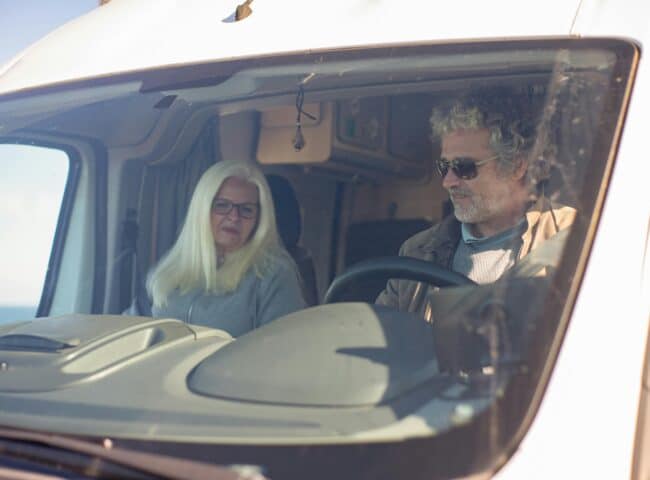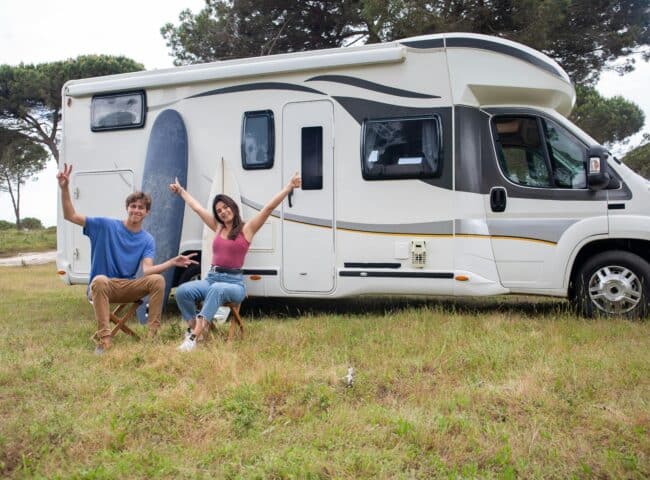Choosing between extended RV warranties vs manufacturer warranties can be a pivotal decision for RV owners. This article cuts through the complexity, highlighting the essential differences that will affect long-term satisfaction and financial well-being. Without delving too deep into details reserved for the main body, expect a straightforward breakdown of each warranty type’s pros and cons within the extended RV warranties vs manufacturer warranties debate, so you can travel with confidence and clear understanding of what’s behind you – your warranty choice.
Key Takeaways
- Manufacturer warranties last 1-3 years on average and cover RV component failures, varying by manufacturer in terms of duration and specifics, while extended warranties offer additional protection against costly repairs for mechanical components and often include perks like roadside assistance.
- Extended RV warranties come in two main types: Exclusionary warranties cover almost everything mechanical except for what’s listed as excluded, while Inclusionary (or ‘listed component’) warranties cover specific listed parts, giving owners the option to decide the extent of coverage they need.
- For claims, manufacturer warranties typically require repairs at authorized facilities, while extended warranties offer more flexibility in choosing repair centers and a simpler claims process, with the potential of more direct payments to the repair facilities.
Deciphering RV Warranty Options: Manufacturer vs Extended Coverage
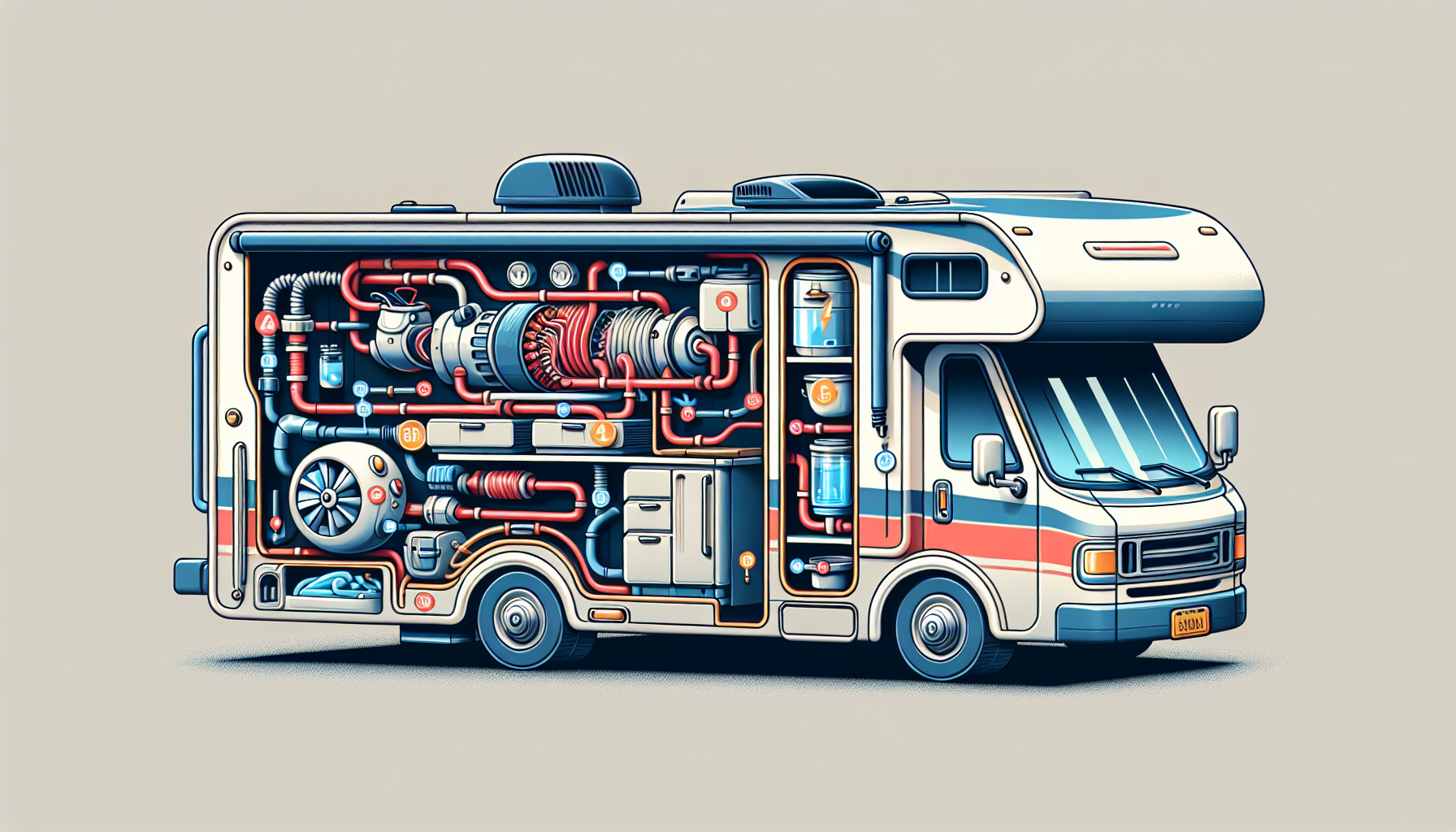
An informed decision between manufacturer and extended warranties can significantly impact your RV’s protection. Manufacturer warranties, as the name suggests, are provided by the RV’s manufacturer. They are designed to cover the failure of RV components during normal use throughout the warranty period. So, if something like your RV’s windows, walls, or leveling systems fail, your manufacturer warranty has got you covered. However, accidents, neglect, and improper maintenance are not part of the deal. Also, be aware that the duration and specific coverage details of manufacturer warranties can vary, so it’s always a good idea to carefully review the details before finalizing your purchase.
The Lifespan of Manufacturer Warranties
You might be wondering about the duration of manufacturer warranties. Most new RV warranties range from 1 to 3 years, with some manufacturers offering up to a 5-year limited structural warranty. Different manufacturers offer different warranty terms. For instance:
- Jayco offers a 2-year limited warranty
- Tiffin has warranties ranging up to 10 years for construction
- Winnebago provides a 3-year/36,000-mile structural warranty.
The coverage components in these warranties vary as well, with some including roadside assistance and others providing roof coverage. The variety in warranty terms means consumers need to carefully review the coverages to understand what protections are provided for their RV.
Exploring Extended RV Warranty Benefits
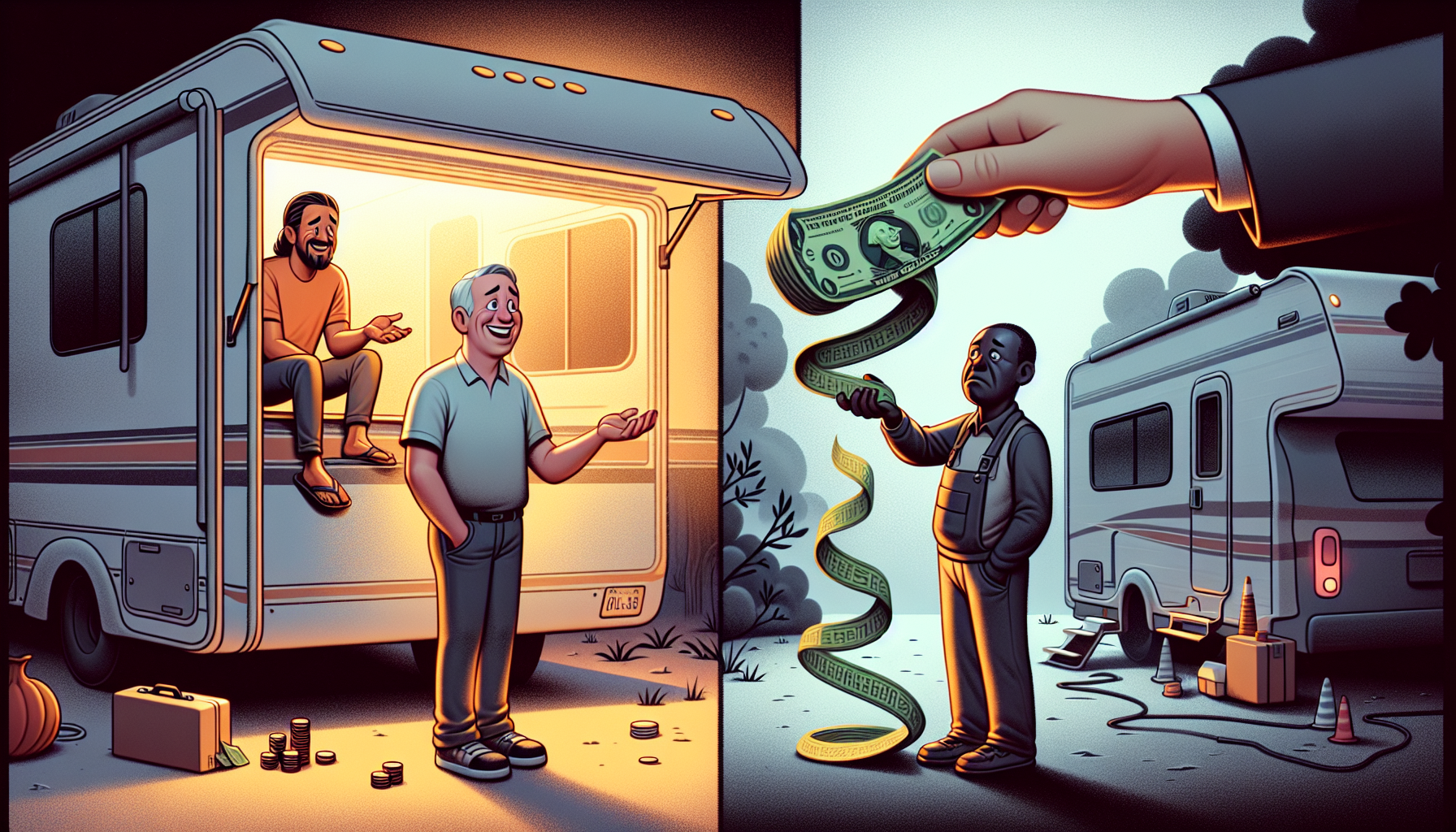
Shifting our focus, we’ll examine the intricacies of extended RV warranties. These RV warranty covers offer financial protection against expensive RV repair bills, providing peace of mind and helping manage unforeseen costs. They typically cover a range of mechanical components, including:
- appliances
- engines
- electrical systems
- other essential parts like slide-outs, furnaces, air conditioners, and water heaters.
For the most comprehensive protection, an exclusionary RV extended warranty is the way to go. It covers nearly all mechanical components unless explicitly listed otherwise. So, if you’re someone who values financial security and peace of mind, investing in an extended RV warranty might just be the thing for you.
Unpacking Extended Warranty Coverage: What’s Really Included?

Having discussed what extended warranties generally cover, we should delve into more specific aspects. An RV Extended Warranty is essentially a policy that covers repair bills for mechanical components, systems, or appliances on an RV, protecting you against unexpected and costly RV repairs. Some examples of what an RV Extended Warranty can cover include:
- Starter
- Transfer switch
- Refrigerator
- Slide-outs
- Furnaces
In addition to these components, extended warranties often include perks such as RV Roadside Assistance and RV Tech Assistance.
Moreover, having an extended warranty can incentivize RV owners to address repairs more promptly, potentially reducing the risk of minor issues escalating into more severe and costly damages.
Delving Into Exclusionary Contracts
Exclusionary contracts are often recommended for those seeking maximum coverage through reputable providers. As the name suggests, these warranties cover almost everything, except for certain items that are explicitly listed as exclusions. Typically, nonmechanical items, items replaced through normal operation, and damage from external events such as accidents, weather, or fire are not covered.
So while an exclusionary RV warranty provides comprehensive protection for your RV, it does not cover the following:
- Carpet
- Rust
- Cabinets
- Paint
- Pre-existing conditions
- Cosmetic damage
Specific exclusions are clearly outlined in the warranty.
Understanding Listed Component Coverage
On the other hand, we have listed component coverage or inclusionary warranties. These warranties protect only the specific components that are explicitly listed in the warranty contract. So, the scope of coverage can vary, with more basic plans typically protecting core components such as the engine and transmission. Higher-tier plans may extend coverage to include items like kitchen appliances, heating and AC components, as well as plumbing and electrical systems.
From suspension, brakes, water systems to kitchen appliances and electrical components, listed component coverage plans have a lot to offer. Some even offer protection for entertainment components, including televisions and satellite dishes. So, if you’re looking for specific coverage for your RV, an inclusionary warranty might be your best bet.
Navigating the Claims Process: Manufacturer vs Extended Warranties
Having discussed the rudiments of RV warranties, it’s time to scrutinize the claims process. If you ever find yourself in a situation where you need to use your warranty, knowing the ins and outs of the claims process can save you a lot of headaches.
For manufacturer warranties, you’ll need to first report your claim to the manufacturer to begin the repair process. On the other hand, extended warranty claims offer more flexibility in repair locations and often have simpler claim procedures.
Manufacturer Warranty Claims
What can you expect from the claims process for manufacturer warranties? First, you’ll need to report your claim to the manufacturer. Then, you’ll need to take your RV to a licensed repair facility that’s authorized by the manufacturer for warranty repairs. This can limit your choice of service centers as not all are authorized by the manufacturer.
Once there, the mechanic will diagnose the issues and send an itemized invoice to the manufacturer, who will then approve any covered repairs. Manufacturer warranties often cover the full retail price for new parts, ensuring that repairs are carried out with quality components. However, always remember to understand what is covered by your manufacturer warranty and follow the proper guidelines to ensure repairs are eligible for coverage.
Handling Extended Warranty Claims
Conversely, extended warranty claims are more flexible. These warranties allow you to have repairs done at various RV repair centers. Before repairs are carried out, it’s necessary to obtain pre-authorization from the warranty provider. The warranty provider then directly pays the RV repair facility for the cost of the mechanical failure repair, reducing the out-of-pocket expenses for you.
Some warranty providers even offer features like reasonable service fees, simple claim procedures, and allow ample time for repair notification. So, if flexibility and convenience are high on your list, an extended warranty might be the way to go.
Cost Analysis: Is an Extended RV Warranty Financially Justified?

A pressing question you may have is whether an extended RV warranty is worth the expense. To answer this, let’s delve into a cost analysis. The price of RV extended warranties can range from a few thousand dollars to $20,000 depending on various factors such as:
- the RV type
- model
- year
- mileage
- coverage level
- length
In general, extended warranty costs are usually higher for motorhomes compared to towable RVs, with Class A motorhomes being the most expensive to cover. Exclusionary policies, due to their comprehensive coverage, generally cost more than listed component policies. However, long-term warranty plans often come with lower annual rates and can be particularly beneficial when acquired for new RVs soon after the manufacturer’s warranty expires.
Assessing Repair Costs Without Coverage
It’s worthwhile to consider the repair costs without warranty coverage. Without warranty coverage, RV repairs can be costly, with labor costs averaging around $120 per hour. Repairs for components such as:
- roof air conditioners
- slide-outs
- braking components
- engine repairs
- fuel system issues
- generator problems
- heating assembly repairs
- leveling system repairs
- refrigerator repairs
can range from a few hundred to several thousand dollars.
Additionally, the financial risk of not having warranty coverage includes the possibility of delaying essential repairs due to inadequate funds, possibly leading to further damage and higher repair costs.
Extended Warranty Investment: Calculating the Value
How can one determine the value of an extended RV warranty? The cost of an RV extended warranty varies depending on various factors, including:
- The type of RV
- Mileage
- Year
- Purchase price
- Engine type
- Make
- Model
- Coverage type
- Deductible
These expenses can range from $1,000 to $20,000 annually, influenced by the level of coverage, the RV’s age, and the choice of warranty provider.
It’s also worth noting that extended warranties for towable RVs such as travel trailers and fifth wheels are generally less expensive than those for motorized RVs, mainly due to the absence of a drivetrain. Purchasing an extended warranty at the time of buying a new RV can secure more prolonged coverage at more favorable rates, even if it overlaps with the manufacturer’s warranty. And based on personal experience, having an RV extended warranty can be worthwhile, providing a sense of confidence and peace of mind, especially for full-time RVers.
Selecting a Trustworthy Warranty Provider
Having discussed the essence and rationale of RV warranties, we should address the choice of provider. Selecting a trustworthy warranty provider is just as important as deciding on the type of coverage you want. Good customer service is a crucial criterion when selecting a warranty provider, with companies offering strong 24/7 support and positive communication with repair facilities being preferred. Seeking advice from experienced RV owners and reading reviews from claimants can help determine a provider’s quality of service.
And always remember, it’s not just about the price. The provider’s reputation within the RV community is equally important. Also, verifying that a warranty company is backed by a reputable insurance company can provide additional security and peace of mind.
Criteria for Evaluating Warranty Companies
Several criteria warrant consideration when evaluating warranty companies. Reliable RV extended warranty providers are typically backed by A-rated insurance carriers, ensuring effective coverage and financial stability. Approval from the Better Business Bureau (BBB) is an important indicator of a warranty company’s reliability and credibility.
The cost of an RV extended warranty is influenced by various factors, including:
- RV type
- Mileage
- Year
- Purchase price
- Engine type
- Make
- Model
- Coverage type
- Deductible
Providers offering transparent information about their plans, including detailed contracts, pricing, coverage limits, and exclusions, are generally preferred over those with less clear communication.
Lastly, assessing online reviews and community opinions is crucial when choosing an RV extended warranty company, as they reflect real customer experiences and satisfaction levels.
Comparing Top Extended Warranty Providers
Given the multitude of providers, distinguishing the top-notch ones can be challenging. Companies such as:
- America’s RV Warranty
- Eagle Vision
- Wholesale Warranties
- Good Sam Extended Service Plan
We offer various RV extended warranty coverage options for RV owners.
Third-party extended warranty providers, such as Wholesale Warranties and Good Sam, can offer comprehensive coverage similar to dealership warranties, often at a lower cost. Extended warranty companies like Wholesale Warranties offer contracts directly to consumers, which are often more affordable than dealer-sold warranties and allow for comparison shopping through quotes.
So, explore, compare, and choose the provider that best meets your needs!
The Right Time to Purchase Extended Warranties
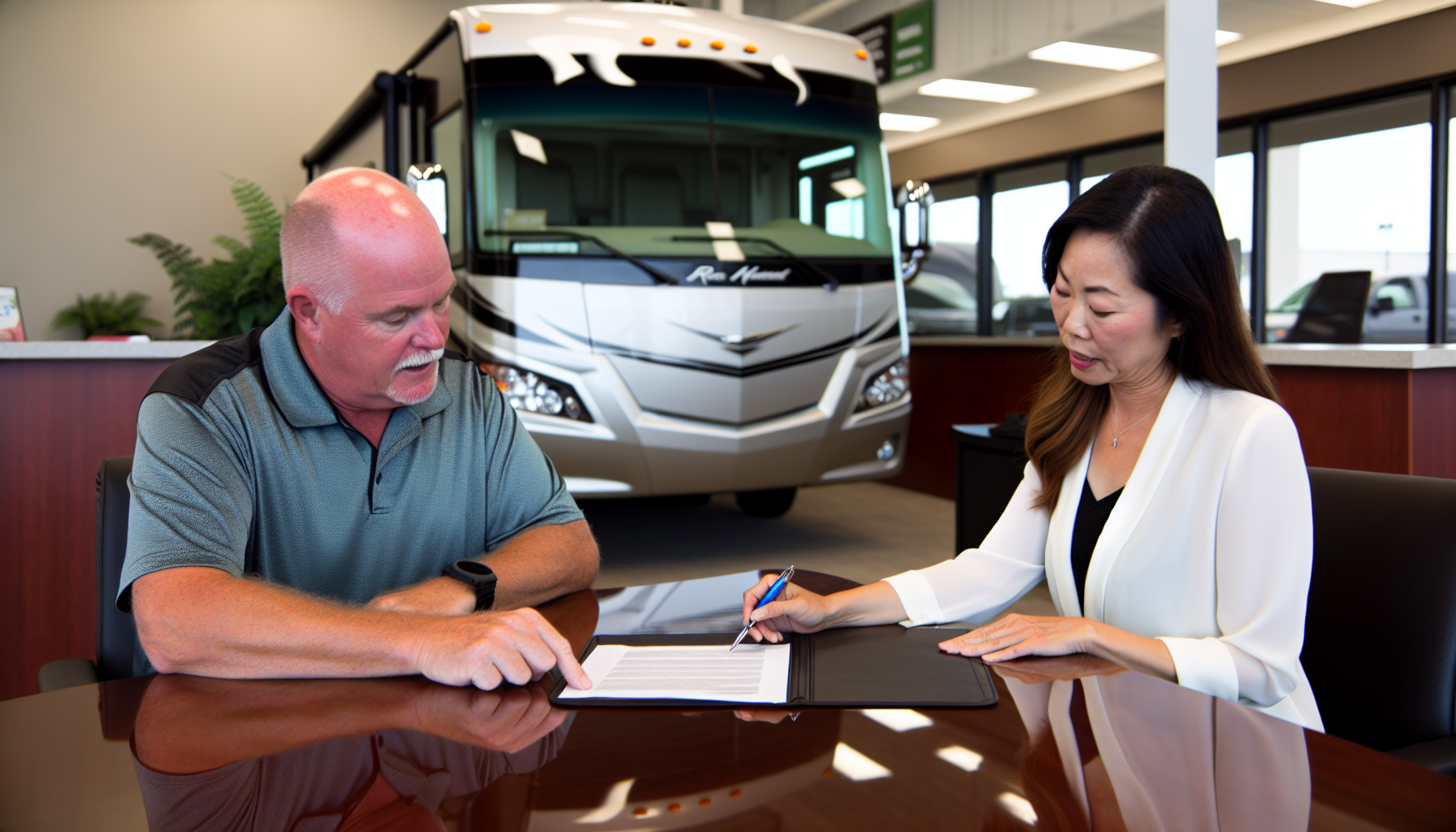
Typically, it’s advisable to purchase an extended warranty when the original warranty nears expiration or when you foresee the need for additional coverage shortly. It’s a good idea to carefully consider your options and the specific terms of the warranty before making a decision. Brand new RVs may not require an immediate extended warranty purchase as the manufacturer’s factory warranty typically covers most repairs at the outset. However, acquiring an extended warranty at the point of purchasing a new RV locks in the cost before any potential price hikes and negates the need for a professional inspection to identify pre-existing conditions.
That said, extended warranties provide flexibility to RV owners, allowing them to make the purchase immediately when buying the RV or at a later time as per their preference or need.
Customizing Your Warranty Plan: Add-Ons and Exclusions
Given that each RV owner has distinct needs, your warranty plan should cater to those specifics. Many extended warranty plans can be tailored to include a wide range of add-on options such as coverage for axles, engines, transmissions, and more comprehensive packages that cover nearly all RV components. For those using their RV as a main residence or frequently throughout the year, full-time use coverage add-ons are crucial to avoid being liable for repair costs. Inclusionary policies can be customized further with extra coverage options such as roadside assistance, towing, travel expenses, power surge protection, and tire and wheel coverage.
But remember, regular servicing and maintenance, collision-related damages, or items like windows, flooring, furniture, upholstery, and awning materials are typically not covered by RV extended warranties.
Summary
We’ve come a long way in our journey to understand the world of RV warranties. From manufacturer to extended warranties, the claims process, cost analysis, to choosing a trustworthy provider, we’ve covered it all. We’ve learned that understanding the differences and benefits of various warranty options can make a significant impact on your RV ownership experience. We’ve also seen how an extended warranty can provide peace of mind and financial security, giving you the freedom to enjoy your RV adventures without worry.
Frequently Asked Questions
Is an extended warranty worth it on a camper?
Yes, an extended warranty can be a good investment for a camper, especially considering the age, mileage, and type of RV. Make sure to thoroughly review the coverage and alternatives before making a decision.
What is the difference between extended warranty and manufacturer warranty?
The manufacturer warranty covers only certain vehicle problems, while an extended warranty covers additional mechanical and electrical issues for an extra cost.
Is extended warranty on top of manufacturer warranty?
Yes, an extended warranty typically begins when the manufacturer’s warranty expires, providing additional coverage for your vehicle’s repairs. It’s an optional plan that can be purchased once the original factory warranty has expired.
What does a manufacturer’s RV warranty typically cover?
A manufacturer’s RV warranty typically covers the failure of RV components during normal use, including structural and powertrain components, but doesn’t cover accidents, neglect, or improper maintenance.
What is an exclusionary RV extended warranty?
An exclusionary RV extended warranty offers extensive coverage for almost all mechanical components unless specifically excluded. It’s a good option for those looking for comprehensive protection.


